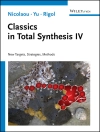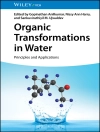Science of Synthesis: Houben-Weyl Methods of Molecular Transformations is the entirely new edition of the acclaimed reference series Houben-Weyl, the standard synthetic chemistry resource since 1909. This new edition is published in English and will comprise 48 volumes published between the years 2000 and 2008.
Science of Synthesis is a quality reference work developed by a highly esteemed editorial board to provide a comprehensive and critical selection of reliable organic and organometallic synthetic methods. This unique resource is designed to be the first point of reference when searching for a synthesis strategy.
- Contains the expertise of presently 400 leading chemists worldwide
- Critically evaluates the preparative applicability and significance of the synthetic methods
- Discusses relevant background information and provides detailed experimental procedures
For full information on the Science of Synthesis series, visit the Science of Synthesis Homepage.
Tabla de materias
<p>48.1 Product Class 1: Acyclic Alkanes<br>48.1.1 Synthesis by Metal Substitution with Retention of the Carbon Framework<br>48.1.2 Synthesis by Metal Substitution with Extension of the Carbon Framework<br>48.1.3 Synthesis by Reduction without C—C Bond Cleavage<br>48.1.3.1 Reduction of Carbonic or Carboxylic Acids, Aldehydes, Ketones, or Derivatives<br>48.1.3.2 Reduction of Haloalkanes<br>48.1.3.3 Reduction of Alkanols and Derivatives<br>48.1.3.4 Reduction of Other Heterofunctionalities<br>48.1.3.5 Reduction of Alkynes<br>48.1.3.6 Reduction of Alkenes<br>48.1.3.6.1 Reduction by Heterogeneous Catalysis<br>48.1.3.6.2 Reduction by Homogeneous Catalysis or Biocatalysis<br>48.1.3.6.3 Reduction by Noncatalytic Methods<br>48.1.4 Synthesis by Reduction of Alkenes via Intermolecular C—C Bond Formation<br>48.1.5 Synthesis by Reduction with C—C Bond Cleavage<br>48.1.6 Synthesis from Other Alkanes<br>48.1.6.1 Bond Cleavage Reactions<br>48.1.6.2 Dehydrodimerization Reactions<br>48.1.6.3 Isomerization Reactions<br>48.2 Product Class 2: Cyclopropanes<br>48.3 Product Class 3: Cyclobutanes<br>48.4 Product Class 4: Five-Membered and Larger-Ring Cycloalkanes<br>48.5 Product Class 5: Hydrocarbon Polymers</p>












